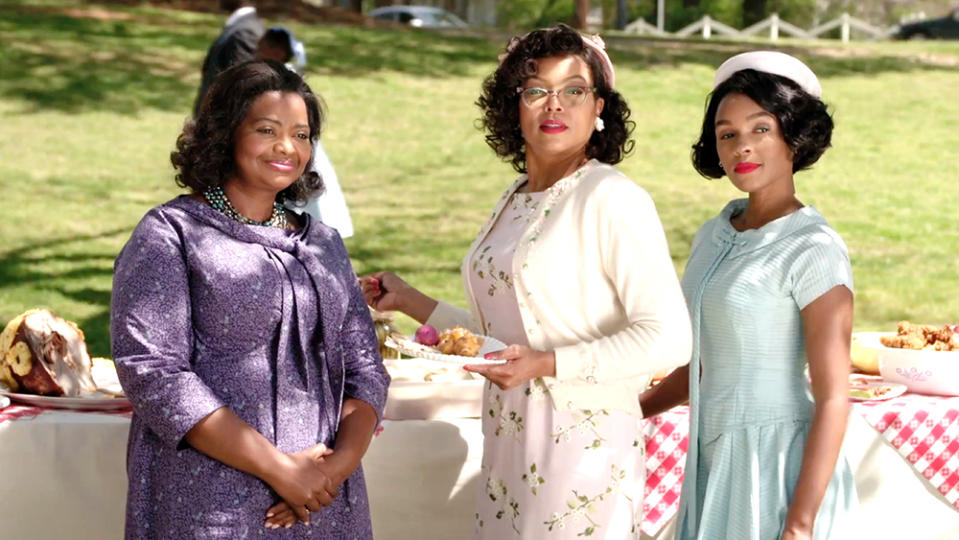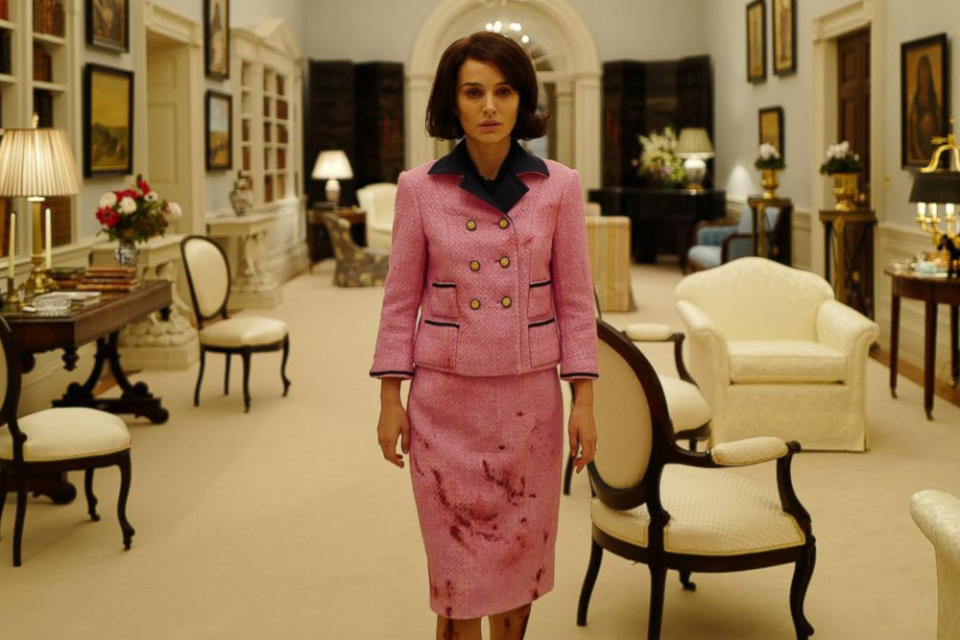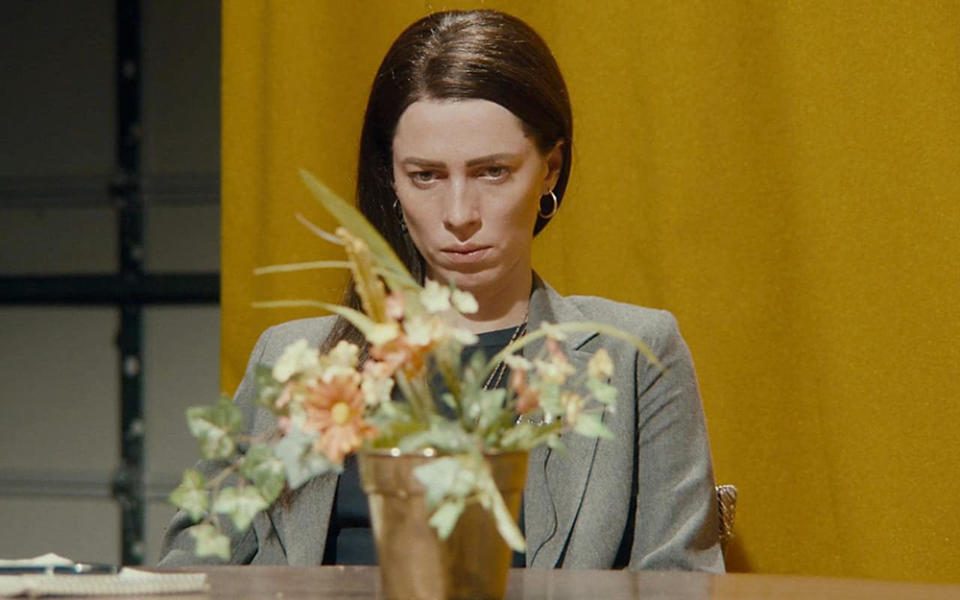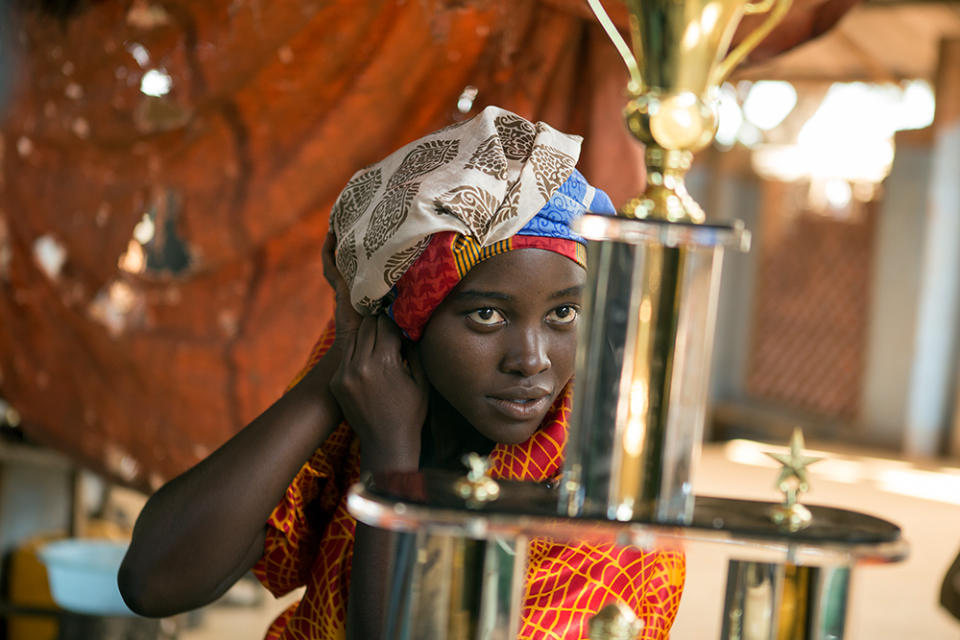Are We About to See a Surge of Female-Fronted Biopics?

The rise of the prestige biopic shows no signs of slowing down. Musicians from Chet Baker to NWA have had their own biographical films in the past few years, as have heroes of all kinds, from "Miracle on the Hudson" pilot Chelsey Sullenberger to Olympic athlete Jesse Owens.
Now, the enormous box office success of Hidden Figures-plus the notable releases of Jackie, Christine, Florence Foster Jenkins, and Queen of Katwe in 2016 alone-shows that filmmakers are finally starting to give women their due.
The familiar archetypes of biographical films-think of the troubled maverick and the flawed genius-are overwhelmingly gendered as male. Accomplished women are missing from far too many mainstream American movies in general, with female characters relegated to background roles. Less than a quarter of all biographical films in the past three years have told women's stories.
Unsurprisingly, one major reason women's stories aren't being told is that too few women are getting the chance to be the storytellers. Ninety-two percent of films released in 2016 were directed by men; only 17 percent of directing, writing, and producing roles were held by women. The result is an erasure of the lives, struggles, and triumphs of countless real women.

That makes the overwhelming commercial and critical success of Hidden Figures a big deal. The film focuses on three real African-American employees at NASA in the early 1960s: Katherine Johnson (played by Taraji P. Henson), Mary Jackson (Janelle Monae), and Dorothy Vaughan (Octavia Spencer). All three were little-known mathematicians who helped the U.S. win the Space Race. Johnson calculated the trajectories of John Glenn's first orbit around the Earth, while Mary Jackson battled to become NASA's first black female engineer. Dorothy Vaughan broke down racial barriers as she managed staff, rising to a powerful supervisory post at NASA.
The past twelve months have shown a wave of momentum for films with real-life female protagonists.
Hidden Figures screenwriter Alison Schroeder is a self-described "NASA baby" (she interned there while still in high school), and she's now a proud Academy Award nominee for Best Adapted Screenplay. "I would say the biggest thing to take note of on this film is the high schools, middle schools, and parents taking their children to this film. I didn't foresee that," she said. "I've had a lot of parents say to me, 'Thank you for this, because it was a film that was appropriate for us to take kids to-and we could really have a discussion about it.' And to give them a new kind of hero was really important."
Even aside from Hidden Figures, the past 12 months have shown a wave of momentum for films with real-life female protagonists. There's been positive critical reception for films about a champion chess player (Queen of Katwe), an astonishingly bad singer (Florence Foster Jenkins), a journalist (Christine), and an iconic first lady (Jackie). Several of those films received Golden Globes, SAG, and Academy Awards nominations, and they mostly eschew the bland prestige stylings of biopics like Diana or the contemptible Grace of Monaco.

But those films still represent a tiny fraction of Hollywood's output, and the numbers still skew male. "I think we need to guard against complacency," said Alison Owen, a veteran Hollywood producer who cofounded Monumental Pictures, a production company focused on telling women's stories. "We can realize that as much as Hidden Figures is great, its one of many, many films. We have to keep pushing so that it's not the exception."
Owen produced notable female-fronted biopics Elizabeth and Sylvia, and is currently working on Hulu's original series Harlots, about a Georgian-era brothel from the prostitutes' perspective. A biographical film about trailblazing mathematician Ada Byron Lovelace is also in the works. "We're currently on the crest of a new wave," she said. "I've seen this wave before, and then it subsides. Hopefully it's the dawning of a new era, and people who control the finances can see that there's money to be made here. Women are over half the audience."
"People who control the finances can see that there's money to be made here. Women are over half the audience."
In spite of sustained evidence to the contrary, women's stories are often still perceived as financial risks. In the blockbuster age, biopics often fall into middle-budget no man's land-not mega-costly, fail-safe franchise fare, but not usually cheap enough to take a flyer. Minimizing that risk means lowering the price tag or guaranteeing a big-name actor for a role.
But that's not always easy. "Movies with female leads have a very hard time finding the men who will be the 'supporter,' because the men want to be the leads," said Women & Hollywood founder Melissa Silverstein. "So you run into that problem, with many men saying, 'Oh no, I'm not going to take that part.' You often can't get an A-list man, or even a B-list man, to play a supporting role beside a female character."
Hidden Figures screenwriter Allison Schroeder said she's had exactly the experience Silverstein describes. "I've certainly gone in and pitched and had them say, 'We love it, but can you change both the leads to men?'" Schroeder said. "And you want to bang your head on the table."

Many female filmmakers have expressed hopes that the box-office success of Hidden Figures-which has made more than $100 million, making it the top-grossing Best Picture nominee of the year-will lead to the green-lighting of other historical women's stories, especially about women of color. But many women-led biopics have lost money over recent years, as with Suffragette (which grossed just $4.7 million in the U.S.). Biopics overall remain a rather small part of major studio budgets; for many financiers, gender may not enter into the equation so much as genre.
Still, Schroeder is hopeful. "I think we've proven a lot in that [women-led biopics] are not an anomaly," she said. "But then there's always an excuse in Hollywood. There's a lot of fear of losing money at the box office. So people want a franchise, or something based on an action figure. Hidden Figures showed that not only can you have a film helmed by women and people of color, but also that it can be an original story. I think audiences are craving that."
"Hidden Figures showed that not only can you have a film helmed by women and people of color, but also that it can be an original story. I think audiences are craving that."
Of the recent female-fronted biopics, the more uplifting ones (Hidden Figures, Florence Foster Jenkins) have been far more financially successful than the ones about grief and depression (Jackie, Christine). "I'm trying to find my next project, and there's a lot of people reaching out to me with female-driven stories," Schroeder said. "But I'm being very selective, because I know that as a writer, I need it to be a story that has a sense of humor to make the hard times more palatable. And I think that might be the key to getting some of these films made."
Owen agrees. "The problem with women's biopics [is getting] the momentum or structure that feels hopeful," she said. Triumphant narratives are more friendly to commercial demands, and when pitching a woman's story, a happy ending may well sweeten the deal. "Just being able to tell these stories is triumphant," Owen added.

Focus Features and Fox Searchlight have been on the forefront of telling women's stories; Fox Searchlight is responsible for Hidden Figures and Amma Asante's Belle, while Focus Features' 2017 slate includes The Zookeeper's Wife. In an effort to get more screenplays with female protagonists produced, Barnard College's Athena Film Festival holds a yearly contest and selects the best scripts for readings and development. Some real-life subjects of these screenplays include Marie Curie, Patricia Highsmith, and Bessie Stringfield, a black woman who served as a heroic motorcycle messenger during World War II.
Meanwhile, Schroeder is working on a miniseries about women throughout history, partly inspired by one of her daughter's feminist storybooks. Monumental Pictures cofounder Debra Hayward is working on a project about the first woman students allowed into Cambridge University in 1869. Owen is passionate about the story of Sarah Weddington, the 26-year-old Texas lawyer who argued and won Roe v. Wade in front of the Supreme Court. Other upcoming releases, include I, Tonya, about disgraced Olympic figure skater Tonya Harding, and Woman Walks Ahead, a biopic of 19th-century artist Catherine Weldon, who became an activist for Native American land rights.
"Women are constantly getting erased. This is about not being erased from history."
"The thing about female stories is you want to get beyond just telling stories about 'the first' woman," Hayward said. "You want to tell stories that are interesting in any case."
Silverstein summed up the perspective of many women in the industry, arguing that films-particularly historical ones-are a way for people to understand their role in culture. "When you don't have women's stories, you're missing from the culture. That means you don't count. Women are constantly getting erased. This is about not being erased from history."
The #filmherstory hashtag, which was started by a group of female filmmakers and journalists on Twitter in 2015, led to the creation of a database of more than 600 real women who would make fascinating biopic subjects. These women's experiences decades or centuries ago have contemporary resonance that informs us today. Cinema is arguably the most influential mass medium ever created-and, as Hidden Figures has showed, elevating women's stories to the screen makes for excellent movies.
You Might Also Like

